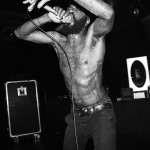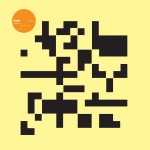By Aaron Richter
Alain Bashung died on Sunday, March 14. The next day, I listened to the French singer’s music for the first time. I found a copy of Bleu pétrole, released just this past year and considered Bashung’s late masterpiece, and heard a voice–familiar and bold, sorrowful and dramatic, broken yet defiant. Its Frenchness implied the cursory touchstone of his predecessor Serge Gainsbourg, but its brazen, romantic attitude echoed Leonard Cohen, a slinky cover of Cohen’s “Suzanne” infused with liquid grace in Bashung’s hands.
Bashung died of lung cancer. He was 61 and had released 14 albums and countless singles since his debut in 1966. Though I’d never heard of him before reading the condolences and tributes from fans following his passing, and I doubt I was alone in my obliviousness. The record charted No. 1 in France but didn’t earn a single vote on the Village Voice‘s annual Pazz & Jop critics poll–shameful neglect for such remarkable songwriting (since when has “import only” halted our listening habits?). His death felt strangely emotional for me; Alain Bashung composed his best music during my lifetime, yet I’d heard none of it. For many, death of the young or old solidifies immortality, ballooning an end-marked career to new unthinkable heights. But what’s to be made of the late discoverer, the music fan whose interest is first piqued with a tantalizing postmortem? Can tardy ears overcome the stigma of sweeping inadequacy? And what have we lost in failing to celebrate an artist in his or her living days?
Only two musicians’ deaths have truly moved me–only one of which actually brought me to tears. I remember learning about Elliott Smith’s suicide when a friend called to share the tragic news. Stunned, not sad, was my response. It felt too proper, too expected of an ending for Smith, and I recall replying with a simple “Jesus, that’s awful” followed by a long silence before hanging up the phone and listening to Either/Or with my girlfriend at the time, who wasn’t nearly as sad as I was about Smith’s death. It was the means by which he did it that shocked me most. A knife through the chest. Damn. It still makes me shiver thinking about it today whenever I hear “Speed Trials.” But I didn’t cry. I did for Arthur Lee, however. Sobbed my eyes out alone in my bedroom, only a few months after moving into my first New York apartment, blasting Forever Changes and “Everybody’s Gotta Live,” no doubt waking my roommates with a string of muffled boo-hoos.
[audio:http://www.self-titledmag.com/wp-content/uploads/2009/03/09-suzanne.mp3]Alain Bashung’s French-language adaptation of “Suzanne” by Leonard Cohen
Both artists I had cherished during their lives–Smith for his melancholy appropriateness for a college-age boy discovering the baby steps toward the scary real world, and Lee for the beautiful work of his past, a gateway drug for my developing musical tastes. It might seem silly, but simply the fact that Lee was still alive when I first discovered his music–no matter if he was in prison, or struggling in his battle with leukemia–gave my connection to his records a deeper bond. This voice and songwriting talent I was hearing was out there somewhere, breathing the same air as I was. That was a thrill.
So it’s quite embarrassing to admit that I cannot say the same for another two of my favorite artists: The Notorious B.I.G. and Kurt Cobain. Maybe blame my parents for gettin’ busy a few years too late, or the cultural temperature of St. Louis tweens at the time I was growing up there, but I’ve always suffered the feeling of inferiority for having started my B.I.G. and Nirvana obsessions post-deaths. I’d heard Nirvana, sure, before Cobain’s suicide. It was difficult not to catch a whiff of “Teen Spirit” while indulging the occasional mainstream rock radio. But his death, instead, was the catalyst for my shifting fandom away from Michael Jackson and MC Hammer and toward the likes of Green Day, Pearl Jam and Smashing Pumpkins. I first heard of B.I.G. at the news of his murder, either on TV or in a newspaper. Until then, my hip-hop consumption was limited to Wu-Tang Clan and Bone Thugs-n-Harmony, thanks mostly to the influence of a friend’s older brother and the CDs he left lying around their living room. I remember roller-blading to the mall to buy Ready to Die, hoping the clerk would overlook the Parental Advisory sticker on its cover and not ask if my mom or dad was around to approve the purchase. Back at home, listening to the album gave me a hunger. It was dirty and dangerous, completely different from anything my ears had yet been exposed to.
But I couldn’t overcome the feeling that I’d missed out. Why couldn’t I have taken an interest in the preceding years, when the creativity flowing through the speakers was fresh and electric? Obviously my age was an obstacle I couldn’t change. So what did I do? I tried my best compensate–listening constantly, memorizing lyrics, learning melodies, adopting the attitude (sometimes in the mirror)–hiding the fact that I was late to the party, even if maybe I was too young to even be held responsible for such oversight.
Alain Bashung’s passing is different. I’m older now. I know about (some) stuff. As a music writer, my awareness and taste cast a broader net, out of responsibility to myself and my readers. But I was too late. I missed out. Or did I? Music has the capacity for permanence, a recorded legacy for all to find. The young can discover the old. The old can discover the young. And everyone can discover the dead and gone, whose work will never be so. But what’s my point (other than transforming loss into a selfish excuse for self-reflection)? I guess just that you really should hear Bleu pétrole. Simple as that. Bashung’s swan song is triumphant, swathed in the same eerie nakedness that characterized Johnny Cash’s American recordings, yet it’s soft and seductive with an inoffensive masculine gentleness. And now, more than ever, Bashung deserves our ears. Even if it is for the first time.
[audio:http://www.self-titledmag.com/wp-content/uploads/2009/03/05-venus.mp3]“Venus,” from Bleu pétrole




